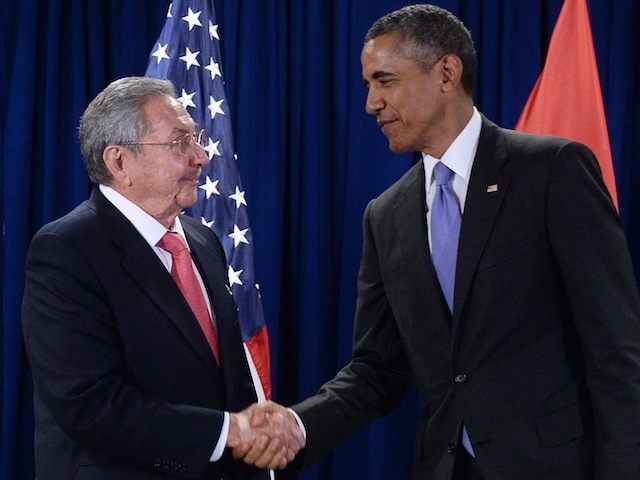The Cuban dissident community has reacted with alarm and dismay at the news that President Obama will visit the island in March, calling the move “an error” that will likely bring pro-democracy activists “a lot of collateral damage.”
“This will bring consequences,” activist Marta Beatriz Roque told the Spain-based Diario de Cuba. “These sorts of visits bring a lot of collateral damage.”
Roque explained her personal experiences with the Castro regime as a pro-democracy activist: “I had to move from my house because I could not keep living in the same building as my aggressors, who broke my arm through punches.” She added, “It didn’t stop them that I am a 70-year-old woman.”
Roque called President Obama “blind … if he has seen any advances in human rights” since his announcement that the United States would pursue “normalization” with the communist regime.
President Obama will be traveling to Cuba in late March before heading to Argentina. He is expected to meet with dictator Raúl Castro and “other Cuban people.” He is not expected to visit the troops stationed at the Guantánamo Bay Naval Base, which remains open despite a promise by candidate Obama that he would shut the base down immediately upon being elected.
Roque’s concern for collateral damage stems in part from the Cuban government’s violent attacks on dissidents during Pope Francis’ visit in September. More than 250 pro-democracy activists were arrested while Pope Francis was in Havana, including one arrested and beaten in front of Pope Francis’ convoy for saying the word “freedom” near the Pope. Pope Francis denied having any knowledge of the event that happened before him.
Roque is joined by a chorus of well-known activists who expressed dismay that President Obama would visit before Cuban officials showed any interest in free expression. Visiting “in these conditions,” said Cuban dissident leader Antonio Rodiles, “is giving the Castro regime a pat on the back.” Rodiles noted that politically motivated arrests “are more violent now,” and he sees nothing “that indicates things are going in a good direction.”
Guillermo Fariñas, a Cuban dissident who won the European Parliament’s Sakharov Prize after his 24th hunger strike against the Castro regime, called the visit, simply, “an error.” He said in the statement, “It is an error to take this step towards the Cuban government without a public political commitment to shift the totalitarian Castro regime towards a state that respects rights.”
Danilo Maldonado, an artist known as El Sexto, has expressed a lack of confidence in any international activity improving the state of Cubans on the island. The only way to change Cuba, he tells independent outlet 14ymedio, “is for the Cuban people to awaken internally.” Maldonaldo blames Cuban artists for “this system getting this far,” claiming many artists have worked on behalf of the regime out of fear. Maldonado was arrested in 2014 for an artist project in which he intended to free two pigs with the names “Fidel” and “Raúl” painted on their backs in Havana’s Plaza of the Revolution, an homage to George Orwell.
In January, the White House deputy national security adviser, Ben Rhodes, hinted that President Obama sought to visit Cuba before the end of his term. He noted that part of the reason behind considering a visit was that the Obama administration had seen “some degree of change” in Cuba’s respect for human rights, this despite the skyrocketing number of politically motivated arrests and state-sponsored attacks.
“We are not going to say that we have seen any great advances regarding human rights,” an anonymous senior State Department official told 14ymedio, contradicting Rhodes’ claim. “The Cuban state has fundamentally remained just as oppressive.” The official excused the visit as part of an effort to show the world “with absolute clarity that [Cuba’s] problems are caused by the politics of the Cuban government and are not the fault of the United States.”

COMMENTS
Please let us know if you're having issues with commenting.